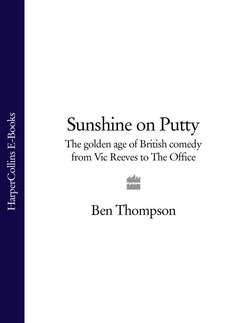Читать книгу Sunshine on Putty: The Golden Age of British Comedy from Vic Reeves to The Office - Ben Thompson, Ben Thompson - Страница 23
‘What did you do in the comedy war, Daddy?’
ОглавлениеMore than four decades later, the Falklands conflict (itself the result of a badly refrigerated Argentinian beef) would be responsible – at least in the fevered minds of Margaret Thatcher and her tabloid-running dogs—for a similar national awakening. But by this time, the heritage of collective jollity in which J. B. Priestley placed such touching faith would have been subject to a dramatic bifurcation.
‘Alternative comedy grew out of punk,’ Jonathan Ross explains, ‘with the same determination to show an older generation “our values are different from yours”. And once you’ve taken a step down that road, there’s really nowhere else to go but to end up saying you don’t respect any of your predecessors’ values, even though in a way that’s unfair.’
Just as John Lydon got in trouble with Malcolm McLaren for admitting he liked Neil Young, so in the pre-Vic-and-Bob era it was very much not the done thing for up-and-coming alternative comics to allude respectfully to their professional forebears. ‘The older comedians became outcasts,’ remembers Ross (who, in his role as honest broker between the generations, would subsequently do as much as any other individual to bridge the ideological and demographic chasm), ‘but they only had themselves to blame. Because, with a few honourable exceptions such as Bob Monkhouse and Des O’Connor, they were very scathing towards the new generation when they should have welcomed it.’
By the time of Ben Elton’s appearance at the 1987 Royal Variety Performance, the new comedy establishment’s take-over seemed to be more or less complete. ‘Five years after the first series of The Young Ones,’ wrote Mick Middles in When You’re Smiling, his excellent short biography of Les Dawson, ‘the walls of an old order seemed to be crumbling.’ And yet the fact that on this particular occasion an old pre-alternative warhorse like Dawson could win one of the best receptions of the night gave a far surer indication of the way things were heading than many a more obvious portent.
Just as the apparent ideological climax that was the introduction of Margaret Thatcher’s poll tax eventually proved to be the beginning of the Iron Lady’s end, so the Comic Strip planting its standard on the ramparts of ancien régime showbiz actually signalled a rearguard action by the battered survivors of earlier times. And not just in terms of influence. (Les Dawson’s magnificently sardonic hosting of mid-period Blankety Blank would later be cited by Vic Reeves as a model for his own demeanour on the Big Night Out.) In the late eighties, northern theatrical impresario Larry Price told Middles, ‘the people who had been all but wiped away by alternative comedy suddenly started coming back…We’d all been told they’d gone for good, but the audiences wouldn’t have it.’
Pantomime bookings went through the roof, and some of those who’d grown fat and lazy on the rich pickings of pre-alternative TV came back with a point to prove. There was something inspiring about the spectacle of battle-scarred comedy campaigners scrapping their way back to social respectability.
Take Bob Monkhouse, for example. (And anyone whose response is ‘I wish you would’ has not read Bob’s fantastic autobiography, Crying with Laughter.) There was no height to which he would not stoop to reclaim his rightful place in the comedic spotlight: going head to head with Frank Skinner on Gag Tag, wiping the floor with his rival panellists on Have I Got News for You, even delivering the following unforgettable killer blow to the unfortunate Bobby Davro on ITV’s An Audience with Bob Monkhouse: ‘You’ll be remembered after Robin Williams has been forgotten…But not until then.’
This rehabilitation of the old-school comic would culminate, a decade or so later, in Phoenix Nights, Peter Kay’s elegiac love-letter to the working men’s club. And in the not-so-edifying spectacle of Bernard Manning’s return to prime-time TV, eating his tea in his Y-fronts on The Entertainers (then, a year or so later – even less edifyingly – being sent to India with a camera crew in tow).
From the easy-going vantage point of the early twenty-first century, the idea of an ideological divide in comedy which actually meant something might seem somewhat elusive. But you wouldn’t have to spend very long in Manning’s Embassy Club to rediscover it.44
